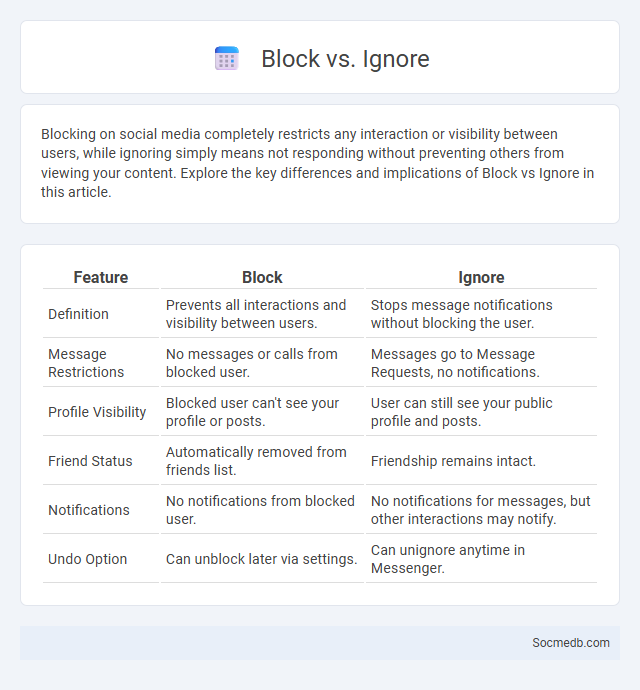
Photo illustration: Block vs Ignore
Blocking on social media completely restricts any interaction or visibility between users, while ignoring simply means not responding without preventing others from viewing your content. Explore the key differences and implications of Block vs Ignore in this article.
Table of Comparison
| Feature | Block | Ignore |
|---|---|---|
| Definition | Prevents all interactions and visibility between users. | Stops message notifications without blocking the user. |
| Message Restrictions | No messages or calls from blocked user. | Messages go to Message Requests, no notifications. |
| Profile Visibility | Blocked user can't see your profile or posts. | User can still see your public profile and posts. |
| Friend Status | Automatically removed from friends list. | Friendship remains intact. |
| Notifications | No notifications from blocked user. | No notifications for messages, but other interactions may notify. |
| Undo Option | Can unblock later via settings. | Can unignore anytime in Messenger. |
Understanding Block, Ignore, and Block: Key Differences
Understanding the distinctions between block, ignore, and mute functions on social media is crucial for managing online interactions effectively. Blocking a user completely restricts their ability to view your profile or contact you, ensuring total disconnection, while ignoring typically refers to avoiding responses without restricting visibility or interaction. Muting, on the other hand, allows users to stop seeing updates from a person without notifying them or cutting off direct communication.
What Does "Block" Mean in Digital Communication?
In digital communication, "block" means restricting another user from interacting with you on social media platforms, preventing them from viewing your profile, sending messages, or commenting on your posts. When you block someone, their access to your online presence is significantly limited, enhancing your control over personal boundaries and privacy. Understanding this feature is essential for managing your digital interactions and safeguarding your social media experience.
The Function of "Ignore" in Social Platforms
The "Ignore" function on social media platforms allows users to filter out unwanted interactions without notifying the other party, enhancing personal privacy and control over one's digital environment. It helps maintain mental well-being by reducing exposure to negative or irrelevant content, thereby improving the overall user experience. Your ability to selectively engage or disengage ensures a safer and more personalized online interaction.
Block vs Ignore: When to Use Each Feature
Block and Ignore serve distinct purposes for managing your social media interactions. Use Block to completely prevent a user from viewing your profile or contacting you, ideal for harassment or persistent negativity. Choose Ignore to stop receiving notifications from someone without alerting them, useful for avoiding unwanted attention while maintaining discretion in your online relationships.
How Blocking Impacts User Interaction
Blocking on social media significantly reduces user interaction by preventing direct communication and visibility between accounts, effectively cutting off any form of engagement such as comments, likes, or messaging. This action disrupts social network dynamics, often leading to decreased reach and altered content exposure within users' feeds. The psychological impact of blocking can deter users from participating in discussions, influencing overall platform engagement metrics.
Ignoring: Subtle Approach to Online Annoyances
Ignoring subtle online annoyances, such as passive-aggressive comments or repetitive spam, can be an effective strategy to maintain your mental well-being while navigating social media platforms. By not engaging with these distractions, you reduce the likelihood of escalating conflicts and preserve time for meaningful interactions. This approach helps you stay focused on positive content and genuine connections, enhancing your overall social media experience.
Comparing Privacy and Control: Block vs Ignore
Blocking on social media provides you with comprehensive privacy control by completely restricting unwanted users from viewing your content or interacting with you, whereas ignoring simply hides their messages without notifying them or limiting their ability to see your profile. The block function ensures a stronger barrier against harassment or spam, offering peace of mind and enhanced security, while ignoring is less intrusive but offers minimal control over your visibility. Choosing between block and ignore depends on how much privacy and user control you require to maintain your social media experience.
Psychological Effects: Blocking versus Ignoring
Blocking on social media can provide immediate psychological relief by creating a clear boundary and reducing exposure to negative content or interactions, which helps decrease stress and anxiety levels. Ignoring, however, may lead to ongoing psychological strain as the unwanted content remains accessible, potentially triggering feelings of frustration or helplessness. Research indicates that active blocking is associated with improved emotional well-being compared to passive ignoring, emphasizing the importance of user control in digital mental health.
Social Etiquette Around Blocking and Ignoring
Blocking and ignoring on social media serve as critical tools for managing digital boundaries and personal well-being by controlling unwarranted interactions and maintaining privacy. Proper social etiquette dictates using blocking sparingly and as a last resort to address harassment, spam, or persistent negativity, while ignoring can be an effective non-confrontational method to avoid unnecessary conflicts. Respecting others' decisions to block or ignore fosters a healthier online community and reduces the prevalence of cyberbullying and toxic behavior.
Choosing the Right Action: Block or Ignore?
Choosing the right action on social media depends on the nature of the interaction and your personal boundaries. Blocking removes unwanted users entirely, preventing any future contact or content visibility, ideal for harassment or spam. Ignoring keeps your feed clean without escalating conflicts, allowing you to maintain control over your online experience while minimizing stress.
 socmedb.com
socmedb.com